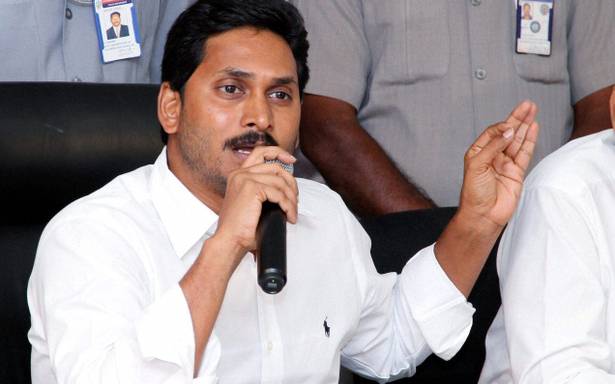
Politics of vengeance throws a spanner in Andhra’s mega projects

Politics of vengeance seems to be guiding the policies of the new Andhra Pradesh government headed by the YSR Congress Party supremo YS Jagan Mohan Reddy.
Reddy’s government is on a spree to cancel contracts of big projects awarded by the previous Telugu Desam Party (TDP) government. Power, irrigation and infrastructure sectors are bearing the brunt of the policy reversals.
After the Polavaram irrigation project, it is now the turn of the Machilipatnam Port project, in Krishna district, to face the state government’s wrath. In a sudden move, on Thursday (August 8) exactly a week after the Polavaram project was scrapped, the agreement to develop a deep water port was cancelled.
Both the projects the lead promoter was Navayuga Engineering Company Limited (NECL).
Impact on investor confidence
A string of unilateral orders, based on technical objections, has raised questions over the fate of several key projects and the possible impact on investor confidence, particularly at a time when Andhra Pradesh is still grappling with bifurcation blues and struggling to attract investments into the state.
The government has now directed NECL to return the 412.57 acres of land that was handed over to it by the previous regime. According to the order, the concessionaire failed to fulfil its obligations like payment of lease rentals and achieving financial closure.
Also read: Media houses face the wrath of Jagan govt in Andhra Pradesh
In February this year, former chief minister N Chandrababu Naidu laid the foundation stone for the deep sea port to be constructed at an estimated cost of Rs 12,000 crore. It is believed that the government’s decision could have been influenced by political factors. In 2012, Navayuga Engineering had pulled out of a key project — Vanpic (Vadarevu and Nizampatnam Industrial corridor located in Guntur and Prakasam districts) — whose main promoter, Nimmagadda Prasad, is considered Jagan’s associate.
Navayuga’s decision to sell its 65% stake in the project was widely seen in political circles as an attempt to distance itself from Jagan who had by then moved out of the Congress and was in the dock for his alleged involvement in corruption cases.
The CBI, its charge sheet, had alleged that Prasad, a leading industrialist, invested Rs 1,000 crore in the companies controlled by Jagan as a quid pro quo arrangement for obtaining land for Vanpic’s industrial corridor and port project.
Also read: Land value hike dampens the mood in Andhra’s real estate sector
NECL was inducted as the lead promoter of the Machilipatnam project in 2009. At the time of laying of foundation stone, it was announced that that the port would be spread across 4,800 acres. The first phase with four berths was expected to be completed and operational in 18 months. It was also announced that the port will have 40 million tonnes capacity in the first phase. When completed, the port’s handling capacity was to go up to 150 million tonnes.
The latest order, issued by the Department of Industry, Infrastructure, Investment and Commerce, made it clear that the government reserves the liberty to claim compensation for the damages suffered by the government from Machilipatnam Port Private Limited (MPPL).
Polavaram faces similar fate
The Rs 58,000 crore, Polavaram project which was scrapped on August 1 was declared a national project in 2016. Some of the key components of the project were awarded to Navayuga. The multi-purpose project across river Godavari is aimed at providing irrigation facility to over seven lakh acres in coastal Andhra, besides producing 960 MW power.
Also read: Jagan in a Catch-22 situation over power purchase agreements
An expert panel, constituted by the government to examine all big ticket projects of the previous regime, has found flaws in the execution of Polavaram project, like slow progress and cost escalations.
The government is now expected to call for fresh tenders.
However, the decision has evoked sharp response from the Opposition. “Despite insults and accusations, we had completed 70% of the construction work. In spite of all this, if the remaining 30% is not completed, Polavaram will remain a dream,” tweeted the TDP chief and former Chief Minister Chandrababu Naidu.
Also read: Naidu proposes, Jagan disposes: How Amaravati landed in hot water
Former TDP minister Vadde Sobhanadreswara Rao, who is now staying away from active politics, said that the project should be continued while simultaneously conducting inquiry into the allegation of corruption.
“There is no doubt that Chandrababu Naidu made some unrealistic promises about the timeline for completion of the project but stopping it entirely is not a correct step,” said Rao who is widely respected in political circles.
TDP MLA from Rajahmundry G Butchaiah Chowdary alleged that the government’s vindictive attitude had led to the stalling of important development projects.
V for Vendetta
A look at a series of steps taken in the last 70 days shows that Jagan is more interested in scoring political brownie points against his bête noire Chandrababu Naidu and “exposing the omissions and commissions” of the previous regime than improving the governance.
From ordering demolition of “Praja Vedika”, a swanky convention hall adjacent to Naidu’s rented riverside bungalow in Vijayawada to halting work in Amaravati, the dream capital of Andhra, and cancelling the contracts of mega projects, the government’s actions have kicked up political controversy and raised questions over the fate of several key projects in the state.
It has also angered the Centre by its decision to review Power Purchase Agreements (PPAs) made during the previous TDP regime with solar and wind power producers. The union government has warned that revisiting the PPAs would halt the flow of foreign investments into the sector, which holds key to meet environmental and power needs of the country.

